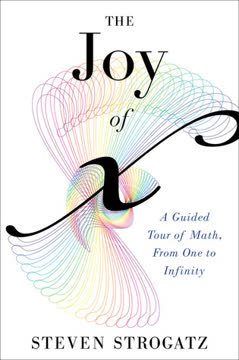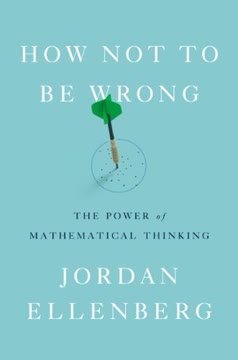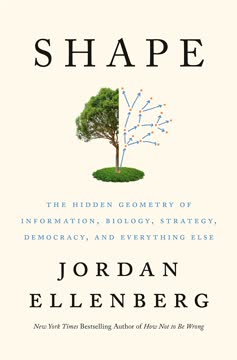Key Takeaways
1. Innumeracy: The widespread inability to deal with numbers
"Innumeracy, an inability to deal comfortably with the fundamental notions of number and chance, plagues far too many otherwise knowledgeable citizens."
Definition and impact. Innumeracy refers to the inability to understand and work with basic mathematical concepts, particularly numbers and probabilities. This widespread problem affects people from all walks of life, including those who are otherwise well-educated. The consequences of innumeracy extend far beyond simple arithmetic errors:
- Personal finance: Difficulty in budgeting, understanding loans, or evaluating investment opportunities
- Health decisions: Misinterpreting medical statistics or risk factors
- Political engagement: Inability to critically assess policies based on numerical data
- Consumer choices: Falling prey to misleading advertising or scams
Cultural acceptance. Unlike other forms of ignorance, innumeracy is often socially acceptable and even flaunted. People proudly proclaim their inability to balance a checkbook or perform basic calculations, reinforcing the misconception that mathematical skills are innate rather than learned.
2. The power of estimation and mental math in everyday life
"Without some appreciation of common large numbers, it's impossible to react with the proper skepticism to terrifying reports that more than a million American kids are kidnapped each year, or with the proper sobriety to a warhead carrying a megaton of explosive power—the equivalent of a million tons (or two billion pounds) of TNT."
Developing number sense. The ability to estimate and perform quick mental calculations is crucial for navigating the modern world. This skill allows individuals to:
- Quickly assess the plausibility of claims and statistics
- Make informed decisions in time-sensitive situations
- Understand scales and proportions in various contexts
Practical techniques. To improve estimation skills:
- Round numbers to make calculations easier
- Use benchmarks and comparisons (e.g., population of a country, distance between cities)
- Practice mental math regularly in daily life situations
By honing these skills, people can become more critical consumers of information and make better-informed decisions in both personal and professional contexts.
3. Probability and coincidence: Understanding the likelihood of events
"The paradoxical conclusion is that it would be very unlikely for unlikely events not to occur."
Counterintuitive nature of probability. Many people struggle to understand probability, leading to misconceptions about the likelihood of events. This misunderstanding can result in:
- Overreaction to rare but dramatic events (e.g., terrorist attacks)
- Underestimation of common but less publicized risks (e.g., car accidents)
- Belief in pseudoscientific claims based on apparent coincidences
Key concepts:
- Law of large numbers: As sample size increases, results tend to converge on the expected probability
- Birthday problem: In a group of 23 people, there's a 50% chance two share a birthday
- Regression to the mean: Extreme results tend to be followed by more average ones
Understanding these principles helps individuals make more rational decisions and avoid being misled by seemingly improbable events or patterns.
4. Pseudoscience and its relationship with innumeracy
"Applying old mathematics, in fact, is often more difficult than discovering new mathematics. Any bit of nonsense can be computerized—astrology, biorhythms, the I Ching—but that doesn't make the nonsense any more valid."
The appeal of pseudoscience. Innumeracy often leads people to embrace pseudoscientific beliefs, which offer simple explanations for complex phenomena. Common examples include:
- Astrology and horoscopes
- Psychic predictions and ESP
- Alternative medicine without scientific evidence
- Conspiracy theories based on misunderstood statistics
Critical thinking skills. To combat pseudoscience:
- Look for falsifiable claims and reproducible results
- Understand the difference between correlation and causation
- Be aware of cognitive biases, such as confirmation bias
- Seek out peer-reviewed scientific sources
By developing these skills, individuals can better distinguish between legitimate scientific claims and pseudoscientific nonsense, leading to more informed decision-making in various aspects of life.
5. The psychological roots of innumeracy and math anxiety
"Math anxiety, what Sheila Tobias calls math anxiety. In Overcoming Math Anxiety she describes the block many people (especially women) have to any kind of mathematics, even arithmetic."
Origins of math anxiety. Many factors contribute to the development of math anxiety and innumeracy:
- Negative early experiences with mathematics
- Cultural attitudes that mathematics is inherently difficult
- Stereotypes about who can excel in math (e.g., gender biases)
- Emphasis on rote memorization rather than understanding concepts
Overcoming mental blocks. Strategies to address math anxiety include:
- Reframing mathematics as a tool for problem-solving rather than an abstract discipline
- Focusing on real-world applications of mathematical concepts
- Breaking down complex problems into smaller, manageable steps
- Seeking out supportive learning environments and resources
By addressing the psychological barriers to mathematical understanding, individuals can develop greater confidence in their abilities and overcome innumeracy.
6. Statistics, trade-offs, and societal decision-making
"There is no such thing as a free lunch, and even if there were, there'd be no guarantee against indigestion."
The role of statistics in policy. Statistical literacy is crucial for making informed decisions at both individual and societal levels. Key concepts include:
- Understanding margins of error and confidence intervals in polls and surveys
- Recognizing the importance of sample size and selection bias
- Evaluating the trade-offs inherent in policy decisions
Balancing competing interests. Many societal decisions involve weighing different risks and benefits:
- Public health measures vs. economic impacts
- Environmental regulations vs. industry growth
- Individual privacy vs. collective security
By improving statistical literacy, citizens can better participate in democratic processes and evaluate the merits of various policy proposals.
7. Correlation, causation, and common statistical mistakes
"Correlation and causation are two quite different words, and the innumerate are more prone to mistake them than most."
Distinguishing correlation and causation. One of the most common statistical errors is confusing correlation with causation. This can lead to:
- Misattribution of cause and effect
- Overlooking important confounding variables
- Drawing incorrect conclusions from data
Examples of misinterpretation:
- Associating ice cream sales with crime rates (both increase in summer)
- Assuming that education level directly causes higher income (ignoring factors like family background, career choice, etc.)
Avoiding common pitfalls. To improve statistical reasoning:
- Look for alternative explanations and confounding variables
- Consider the direction of causality (if any exists)
- Be aware of selection bias and sampling errors
- Understand the limitations of observational studies vs. controlled experiments
By developing a more nuanced understanding of statistical concepts, individuals can better interpret data and avoid drawing misleading conclusions.
8. The importance of mathematical literacy in modern society
"Mathematics as a useful tool or as a way of thinking or as a source of pleasure is a notion quite foreign to most elementary-education curricula (even to those whose textbooks are adequate)."
The far-reaching impact of numeracy. Mathematical literacy is essential for:
- Personal financial management
- Career advancement in many fields
- Informed citizenship and political participation
- Critical thinking and problem-solving skills
Improving mathematical education. To address innumeracy on a societal level:
- Emphasize practical applications of mathematics in education
- Incorporate problem-solving and estimation skills into curricula
- Promote a growth mindset regarding mathematical ability
- Provide resources for adults to improve their numerical skills
By recognizing the importance of mathematical literacy and taking steps to improve it at both individual and societal levels, we can create a more informed, critical, and capable populace better equipped to navigate the complexities of the modern world.
Last updated:
FAQ
What's "Innumeracy: Mathematical Illiteracy and Its Consequences" about?
- Overview: The book, written by John Allen Paulos, explores the widespread issue of innumeracy, which is the inability to comfortably deal with numbers and probabilities.
- Consequences: It discusses the real-world consequences of mathematical illiteracy, such as susceptibility to pseudoscience, poor decision-making, and misunderstanding of risks.
- Examples and Principles: Paulos uses a variety of examples, from stock-market scams to pseudoscientific beliefs, to illustrate how innumeracy affects individuals and society.
- Educational Insight: The book also delves into the educational system's role in perpetuating innumeracy and offers insights into improving mathematical literacy.
Why should I read "Innumeracy: Mathematical Illiteracy and Its Consequences"?
- Awareness: It raises awareness about the importance of mathematical literacy in everyday life and its impact on personal and societal decisions.
- Practical Applications: The book provides practical examples and applications of mathematical concepts, making it relevant for understanding real-world issues.
- Critical Thinking: It encourages critical thinking and skepticism, especially towards pseudoscientific claims and misleading statistics.
- Educational Value: For educators and students, it offers insights into how math education can be improved to combat innumeracy.
What are the key takeaways of "Innumeracy: Mathematical Illiteracy and Its Consequences"?
- Importance of Numeracy: Understanding numbers and probabilities is crucial for making informed decisions and avoiding manipulation.
- Role of Education: The book highlights the need for better math education to prevent innumeracy from an early age.
- Skepticism Towards Pseudoscience: It emphasizes the importance of skepticism and critical thinking in evaluating pseudoscientific claims.
- Understanding Risk: Paulos illustrates how innumeracy leads to poor risk assessment and decision-making.
What are the best quotes from "Innumeracy: Mathematical Illiteracy and Its Consequences" and what do they mean?
- "Mathematical solecisms... are a bit like piles of garbage; no matter how often they’re picked up, they soon collect again." This quote highlights the persistent nature of mathematical errors and misconceptions in society.
- "Innumeracy, an inability to deal comfortably with the fundamental notions of number and chance, plagues far too many otherwise knowledgeable citizens." It underscores the widespread issue of innumeracy among educated individuals.
- "The surprising likelihood of coincidence is illustrated by the following well-known result in probability." This quote introduces the concept of how people often misunderstand the frequency and significance of coincidences.
- "The approach throughout is gently mathematical, using some elementary ideas from probability and statistics." It reassures readers that the book is accessible and not overly technical.
How does John Allen Paulos define innumeracy in the book?
- Definition: Innumeracy is defined as the inability to comfortably deal with numbers and probabilities, similar to illiteracy but with numbers.
- Consequences: It leads to poor decision-making, susceptibility to pseudoscience, and misunderstanding of risks.
- Examples: Paulos provides examples such as misunderstanding probabilities in gambling or being misled by statistics in the media.
- Educational Aspect: The book discusses how the educational system often fails to address innumeracy effectively.
What examples does "Innumeracy" provide to illustrate mathematical illiteracy?
- Stock-Market Scams: The book describes how innumeracy can lead people to fall for financial scams due to a lack of understanding of probabilities.
- Pseudoscience Beliefs: It highlights how innumeracy makes individuals more susceptible to pseudoscientific claims, such as astrology and parapsychology.
- Misinterpretation of Statistics: Paulos uses examples like misinterpreting medical test results or crime statistics to show the consequences of innumeracy.
- Everyday Decisions: The book illustrates how innumeracy affects everyday decisions, such as assessing risks in travel or health.
What educational insights does "Innumeracy" offer?
- Early Education: The book emphasizes the importance of integrating math into early education to prevent innumeracy from developing.
- Teaching Methods: Paulos suggests using puzzles, games, and real-world problems to make math more engaging and relevant.
- Teacher Competence: It highlights the need for competent math teachers who can effectively communicate mathematical concepts.
- Curriculum Improvement: The book advocates for a curriculum that focuses on understanding when and how to apply mathematical operations, not just performing them.
How does "Innumeracy" address the relationship between innumeracy and pseudoscience?
- Susceptibility: Innumeracy makes individuals more susceptible to pseudoscientific claims because they lack the skills to critically evaluate them.
- Examples: The book discusses astrology, parapsychology, and other pseudosciences as areas where innumeracy leads to gullibility.
- Critical Thinking: Paulos emphasizes the need for critical thinking and skepticism to combat the influence of pseudoscience.
- Educational Role: The book suggests that better math education can help reduce belief in pseudoscience by fostering analytical skills.
What does "Innumeracy" say about the role of probability in everyday life?
- Understanding Risk: Probability is crucial for understanding and assessing risks in everyday decisions, from health to finance.
- Coincidences: The book explains how people often misinterpret coincidences due to a lack of understanding of probability.
- Decision-Making: Probability helps in making informed decisions by evaluating the likelihood of different outcomes.
- Educational Importance: Paulos argues for the inclusion of probability in education to improve numeracy and decision-making skills.
How does "Innumeracy" suggest improving math education?
- Engagement: Use engaging methods like puzzles and real-world problems to teach math concepts.
- Teacher Training: Improve teacher competence in math to ensure effective communication of concepts.
- Curriculum Focus: Focus on understanding when and how to apply math operations, not just performing them.
- Early Integration: Integrate math into early education to prevent innumeracy from developing.
What are some common misconceptions about mathematics addressed in "Innumeracy"?
- Cold and Impersonal: The book challenges the misconception that math is cold and impersonal, showing its relevance to real-world issues.
- Mechanical Nature: It refutes the idea that math is purely mechanical, highlighting its creative and problem-solving aspects.
- Depersonalization: Paulos argues against the belief that math depersonalizes, showing how it can enhance understanding of individuality.
- Limiting Freedom: The book addresses the misconception that math limits freedom, demonstrating how it empowers decision-making.
How does "Innumeracy" relate to societal issues and decision-making?
- Policy Decisions: Innumeracy affects policy decisions by leading to poor risk assessment and misunderstanding of trade-offs.
- Media Influence: The book discusses how innumeracy in the media can lead to sensationalism and misinformed public opinion.
- Economic Impact: It highlights the economic consequences of innumeracy, such as susceptibility to financial scams and poor investment decisions.
- Public Health: Paulos illustrates how innumeracy affects public health decisions, such as misinterpreting medical statistics and risks.
Review Summary
Innumeracy receives mixed reviews. Many readers appreciate its exploration of mathematical illiteracy and its consequences, praising the author's explanations of probability, statistics, and large numbers. However, some find the tone condescending and the examples dated. Critics argue that the book lacks depth and organization, while supporters value its insights into everyday mathematical concepts. Overall, readers agree on the importance of mathematical literacy but differ on the book's effectiveness in addressing the issue.
Similar Books





Download PDF
Download EPUB
.epub digital book format is ideal for reading ebooks on phones, tablets, and e-readers.












